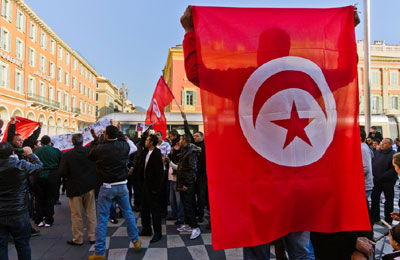
Tunisia to hold elections in June
Tunis, October 14, 2012
Tunisia's ruling coalition, led by the Islamic Ennahda Movement, said early on Sunday it had agreed to hold presidential and parliamentary elections on June 23 with the president being chosen directly by voters.
The coalition's agreement on a date for elections and the establishment of an amended parliamentary system come after widespread criticism from the opposition that Ennahda wants to control the government and avoid elections.
The Islamic Ennahda Movement won the country's first free elections last October following the Tunisia's revolution, which set off last year's "Arab Spring" uprisings. The movement heads a government that also includes two secular parties, the Congress for the Republic and the Ettakatol.
The ruling coalition said in a statement sent to Reuters that an agreement had been reached setting "June 23, 2013, as the date for legislative and presidential elections," with a presidential runoff scheduled for July 7.
"We agreed on the choice of a mixed political system where the election of the president of the republic will be directly by the people ... The political system will ensure a balance between authorities and in the executive authorities," the statement said.
The agreement must be approved by the Constituent Assembly, where the ruling coalition has a majority of the 217 seats.
The agreement will help speed the drafting of a constitution. The form of political system was a big contrast between Ennahda, which called for the parliamentary system, and the rest of the parties, which called for a dual political system.
The amended parliamentary system will have powers balanced by between the parliament and the president.
The announcement of a date for elections may dispel doubts of Tunisia's partners in the West and foreign investors who wish to enter the Tunisian market.
The Constituent Assembly elected Moncef Marzouki president in December 2011 to follow Zine el Abidine, who was ousted as president in January 2011 after weeks of protests. Those protests inspired the wave of "Arab Spring" uprisings that spread across the Middle East and North Africa. - Reuters







